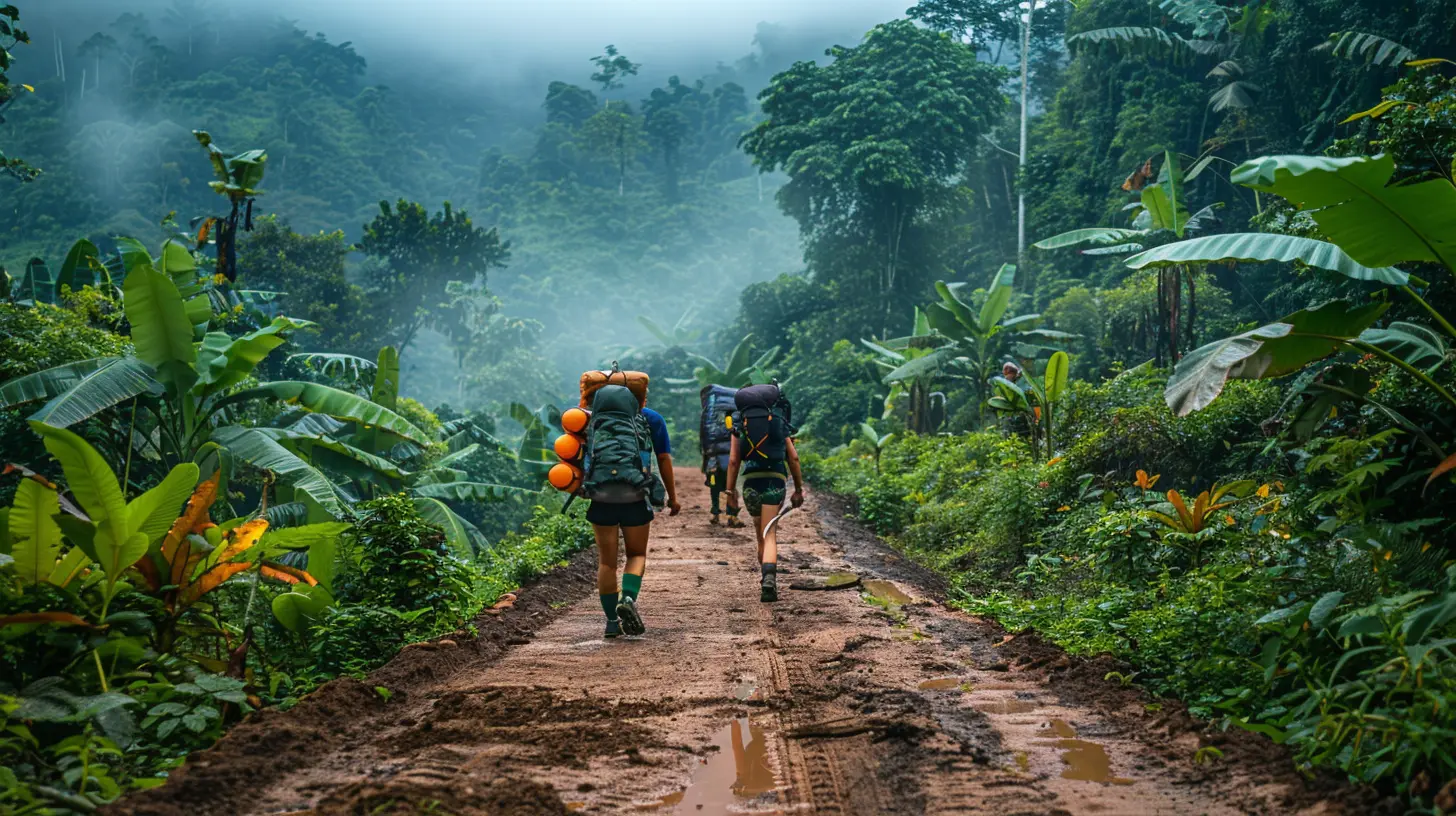22 December 2024
Volunteering abroad is one of the most rewarding experiences you can embark on—it’s an opportunity to discover new cultures, meet incredible people, and make a real impact in communities around the world. But if this is your first journey into the world of international volunteering, you may have a lot of questions and maybe even a few nerves.
Don’t worry! You're not alone. Preparing properly can make a world of difference in ensuring you have an enriching and meaningful experience. In this article, we’re going to walk you through everything you need to know before you take off, from choosing the right program to packing your bags like a pro.
Ready to get started? Let's dive in and make sure you're good to go for your first volunteer abroad adventure!

1. Ask Yourself: Why Am I Doing This?
Before we hit the nitty-gritty details, it’s important to take a moment for some self-reflection. Volunteering abroad is more than just an excuse to travel or pad your resume—it should be primarily about offering your time and skills to communities that truly need it. So, why are you doing it?Are You Motivated By Service or Adventure?
It can be both, of course! But having clear intentions will help you make better choices when selecting your destination and volunteer program.Do you want to work on education projects? Are you passionate about wildlife conservation? The thing is, when you dig deep into why you’re doing this, you’ll be able to find a cause that resonates with you on a personal and emotional level. Plus, it ensures that your motives align with the needs of the community or cause you’re going to serve.

2. Choosing the Right Program
The first major step to preparing for your journey is selecting a volunteer program that best suits your skills, goals, and interests. With so many options out there, it can get overwhelming, but don't lose heart! Let’s break it down:2.1. Research Thoroughly
A quick Google search will present you with hundreds, if not thousands, of volunteer programs. The first thing to keep in mind is this: not all volunteer programs are created equal. Some are well-established and have a clear positive impact, while others... not so much.Check for reviews, testimonials, and the organization's overall mission. Does it align with your values? Are the funds going directly to the cause, or is it primarily going toward administrative costs? Transparency is key here.
2.2. Matching Skillsets with Needs
Be honest about what you can contribute. If you’re great at teaching, lean toward educational programs. If you’re a health professional, look for medical volunteering opportunities. Matching your skills to the needs of the community will maximize the impact of your efforts.2.3. Duration & Commitment
Some programs may demand a substantial time commitment, ranging from a few weeks to a year, while others allow for short-term volunteers. How much time can you commit? Factor this into your decision to ensure you’re fully available while you’re overseas.
3. Budgeting for Your Trip
Let’s get real—volunteering abroad isn’t always cheap. While some programs cover your living expenses in exchange for your service, many will require you to pay for your own transport, accommodation, and even program fees.3.1. Factor in All Costs
When budgeting, look beyond just the program fee. Consider flights, visas, vaccinations, travel insurance, and daily expenses like food or extra travel. This will give you a more comprehensive view of what you’re truly spending.3.2. Fundraising
Can't foot the entire bill yourself? No problem! Many volunteers fundraise to cover the costs of their trip. Crowdfunding platforms like GoFundMe make it easy to share your story and seek support. Reach out to friends, family, and even local businesses!
4. Preparing Documentation
Once you're settled on a program and destination, it's time to handle the paperwork. Trust me—nothing sucks more than being unprepared with your documents when you're about to board that plane!4.1. Passport & Visa Rules
Ensure your passport is valid for at least six months beyond your stay, as most countries have this requirement for entry. Depending on where you’re heading, you might need a visa. Research the visa policies of your destination early to prevent any last-minute mishaps.4.2. Vaccinations & Health Documentation
Depending on where you're going, you might need certain vaccinations or health certificates. Some countries require proof of vaccinations like yellow fever or require specific medications, such as malaria tablets. Schedule these well in advance, as some vaccinations take time to take effect.4.3. Travel Insurance
Don’t skip this! Even if you’re young and healthy, having travel insurance is a non-negotiable. It covers everything from cancelled flights to urgent medical care. Look for policies that offer coverage for voluntourism, as many include things like medical evacuation or coverage if you need to cut your trip short.5. Packing Smart: What to Bring (and What to Leave Behind)
Let’s talk about packing. The trick when volunteering abroad? Less is more.5.1. Essentials Only
Ask yourself: do I really need this? Pack light and bring only the essentials. You’ll likely be working in environments where practical and durable clothing will be more important than fashion statements.Here’s a list of essentials to get you started:
- Comfortable shoes (you’ll be on your feet a lot)
- Clothing appropriate for the culture and climate (for some places, this means modest attire)
- Basic toiletries (depending on your destination, access to certain products may be limited)
- A first-aid kit (better safe than sorry)
- Re-useable water bottle (stay hydrated, and avoid single-use plastics)
5.2. Research Your Destination
Know the climate and environment of your destination before packing. Is it going to be hot and humid? Rainy? Freezing cold? Also, look into cultural practices—some countries have strict dress customs, and it’s important to pack accordingly to avoid unintentionally disrespecting locals.5.3. What NOT to Bring
Avoid overpacking or bringing valuables. You won’t need that fancy jewelry or expensive gadgets where you're going. Plus, it only adds stress if you are worried about theft or loss.6. Cultural Awareness and Sensitivity
You are not just a tourist—you are entering a community with its own values, traditions, and norms. Show respect, stay humble, and be open to learning from the people around you.6.1. Learn Basic Language Skills
No, you don’t need to become fluent, but learning a few basic phrases in the local language can go a long way. It shows respect and effort in connecting with the community. Simple things like greeting the local people in their native language can make them feel appreciated.6.2. Respect the Culture
You’ll be entering a new world, and things aren’t always the same as they are at home. Whether it's how people structure their days or how genders interact, it's essential to follow local customs. Take the time to understand the culture before you go and remain flexible in your expectations.6.3. Avoid the Savior Complex
Remember, you're there to assist, not to "save" anyone. Approach your volunteer work with humility, recognizing that you’re there to learn as much as you’re there to help. The community knows what they need, and you are there to collaborate, not dictate.7. Self-Care and Staying Healthy During Your Trip
Volunteering abroad can be physically and emotionally demanding, so don’t forget about yourself in the process!7.1. Stay Hydrated & Eat Well
It sounds basic, but it's worth reminding yourself. Always drink enough water, especially if you’re in a hot climate. Try to eat well-balanced meals to keep your energy up.7.2. Prioritize Mental Health
It’s not uncommon to experience culture shock. Adapting to a new environment can be emotionally challenging. If you feel overwhelmed, take a break, talk to a fellow volunteer or a program coordinator, and give yourself time to adjust.7.3. Rest is Key
Don’t wear yourself out trying to be a hero. Take the time to rest and recharge when you need to. You'll be more effective and enjoy the experience more if you're well-rested and not running on fumes.8. Embrace the Journey
Lastly (and most importantly), enjoy the experience! Volunteering abroad is a once-in-a-lifetime opportunity to learn, grow, and contribute to something bigger than yourself. Don't stress over the little things—there will always be some bumps in the road.Be patient, stay adaptable, and soak in every moment. You’ll return home with unforgettable memories, meaningful friendships, and the knowledge that you made a difference in the world while it made a difference in you.









Layla McConnell
Pack snacks; your stomach will volunteer too!
February 11, 2025 at 5:23 AM